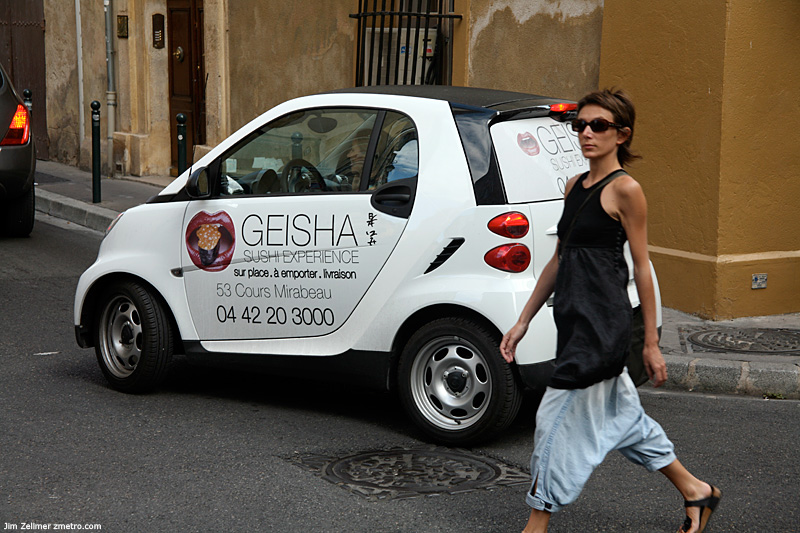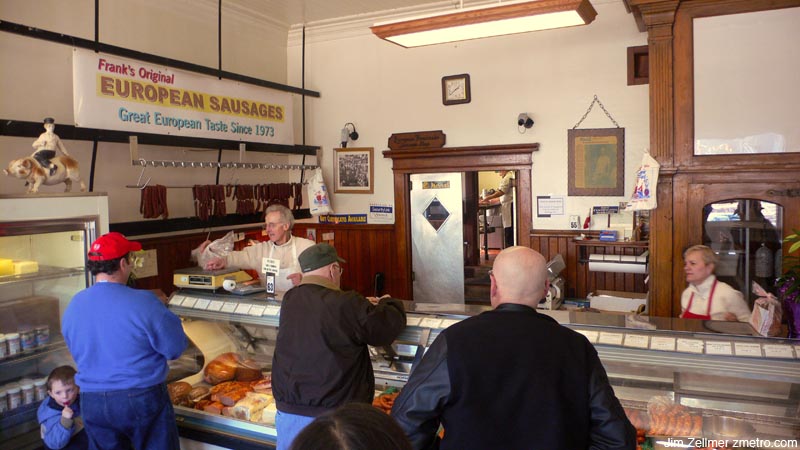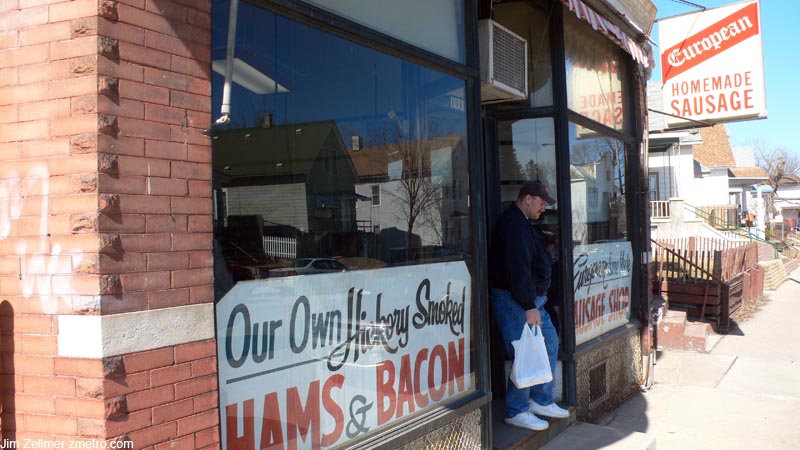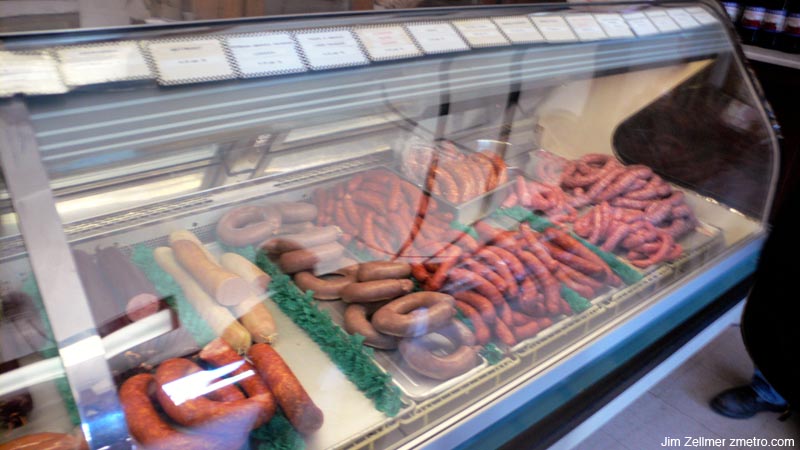Roger O’Neill video takes a look at the Crave Brothers use of methane – from their cow poop – to power the farm and 120 neighboring homes. The farm includes a cheese factory.
Category: Food
A Superb Easter Ham
Thinking of Summer: Aix-en-Provence
 Thoughts of summer as Winter continues in Madison. Note the fashionable sushi delivery vehicle, a Smart Car and the smartly dressed pedestrian. Summer in Provence. Much more on Aix-en-Provence here [map]
Thoughts of summer as Winter continues in Madison. Note the fashionable sushi delivery vehicle, a Smart Car and the smartly dressed pedestrian. Summer in Provence. Much more on Aix-en-Provence here [map]
How Brazil outfarmed the American farmer
Phil Corzine is not abandoning Illinois. A longtime soybean farmer in Assumption, a small town east of Springfield, he is firmly loyal to his state – he once ran the Illinois Soybean Checkoff Board, a program in which Illinois farmers promote Illinois soybeans. But the 1,300 acres Corzine planted in 2007 are not in Illinois, or even in the Midwest. They’re in central Brazil, in the state of Tocantins, part of a big swath of soy-producing lands that stretch between the Andes and the Atlantic forest and from northern Argentina to the southern flanks of the Amazon basin. Soylandia, as this immense region might be called, is almost entirely unknown to Americans. But it may well be the future of one of the world’s most important industries: grain agriculture.
Mainly out of curiosity, Corzine visited Brazil in 1998. Like most U.S. soy producers, he’d noted Brazil’s rapid rise in the trade – from amateur to global power in the space of a couple of decades. Its scale of operations, however, stunned him. A big farm in Illinois may cover 3,000 acres; spreads in Soylandia are routinely ten times bigger. Conditions there were primitive, Corzine thought, but Soylandia was going to expand in a way that was no longer possible in the U.S. With three partners he raised $1.3 million from more than 90 investors, mostly Midwestern farmers. In Illinois, he says, that kind of money “can’t even buy the equipment, let alone the land.” In Brazil it was enough for Corzine’s group to acquire 3,500 acres in 2004. Since then, the land has almost doubled in value as other American investors clamored to get into Brazilian soy. This year Corzine, now 49, raised another $400,000. “We feel like what’s going on is long-term positive,” he says with Midwestern understatement.
Venti Capitalists
Taylor Clark ought to know how Starbucks got its roc-like wingspan. That’s the tale by which we want to be spellbound. Clark quotes a 1997 Larry King interview with Howard Schultz, the company’s chairman, where Schultz outlines what should have been the plot of Clark’s book:
“People weren’t drinking coffee. … So the question is, How could a company create retail stores where coffee was not previously sold, … charge three times more for it than the local doughnut shop, put Italian names on it that no one can pronounce, and then have six million customers a week coming through the stores?”
How Safe Is Your Salad?
Late in August 2006, the federal Centers for Disease Control and Prevention in Atlanta began investigating cases of severe food poisoning reported by health officials in 26 states and one Canadian province. Over the next six weeks, a rare and particularly virulent strain of Escherichia coli 0157:H7 sickened more than 200 people across North America, hospitalizing half of them, some with severe kidney damage, and killing two elderly women and a child. For epidemiologists, the outbreak presented a breakthrough because a DNA-fingerprinting system enabled CDC investigators to trace the source of the infections from clusters of cases nationwide.
Bacteria in stool samples of hospitalized patients were genetically matched to pathogens in packaged, “ready to eat” Dole brand spinach that they had recently purchased and consumed. Further, product codes on the bags indicated that the contaminated greens had been processed during one shift on Aug. 15 at a plant in San Juan Bautista then owned and operated by Natural Selection Foods. The company’s records showed that the spinach had been harvested from four fields in Monterey and San Benito counties.
Vino Volo
Home » About Vino Volo
About Vino Volo
At Vino Volo, our goal is to bring the world of wine tasting and retail wine sales to where it is most convenient for air travelers. Our innovative wine tasting restaurant and retail stores are specifically designed for passengers and our website is available to continue serving them even after they leave the airport.
Vino Volo (derived from Italian for “wine flight”) combines a boutique retail store with a stylish tasting lounge and bar, allowing guests to taste wines in a comfortable setting. Vino Volo serves great wines from across the globe by the glass or in tasting flights. All wines poured are also available for purchase by the bottle, allowing travelers to purchase wines to take with them or have shipped to their home (subject to state law).
Our Stores
Warm wood tones and comfortable leather lounge chairs welcome travelers into a sophisticated yet approachable post-security retreat in the airport terminal. Every Vino Volo location has an integrated retail area showcasing the wines being poured and offers elegant small plates to pair with the wines. Customers enjoy items such as locally-produced artisan cheeses, dry cured meats, and smoked salmon rolls wrapped around crab meat with crème fraiche. All of Vino Volo’s dishes are available for customers to enjoy in the store or packaged to carry with them onto their flight.
7-10 new stores are planned for airports in 2007. We encourage you to check our website periodically for updates on new locations.
About Taste, Inc.
Vino Volo is owned and operated by Taste, Inc., founded in 2004 and backed by industry leaders in wine, retail, and the hospitality industries. Vino Volo plans to open several dozen stores in airports across the country in the next five years. Taste, Inc. is headquartered in San Francisco, California.
Taste, Inc. is led by executives with deep industry expertise. Doug Tomlinson, Taste’s CEO, has over 16 years of career success in launching and spinning off new businesses. Doug has helped several Fortune 500 clients start new businesses or divisions and has been featured as a cover author in Harvard Business Review. Ellen Bozzo, Director of Finance and Administration, has over 20 years of experience in multi-unit retail finance, including the role of Controller for Peet’s Coffee & Tea. Joe LaPanna, Regional General Manager, has over 19 years of experience in high-end restaurant and wine retail management as well as managed the expansion of two major restaurant concepts. Carla Wytmar, Director of Development & Marketing, is a 20-year veteran in the food & wine industry, having worked with Hyatt Hotels Corporation, The Walt Disney World Company and as a consultant to top chefs and wine companies across the country.
Standing behind the Vino Volo team is a group of highly-credentialed investors and advisors with over a century of combined experience in retail, hospitality and wine that include the founder of Ravenswood Winery, the founder of Scharffen Berger Chocolate Maker, and the CEO of Jamba Juice, among others. Each member of this group sits on a formal Advisory Board and actively consults to Vino Volo on its development and execution. “Taste, Inc. DBA Vino Volo” is the California-based legal entity behind all Vino Volo operations.
About our Team
Vino Volo prides itself on building teams dedicated to customer service and with deep expertise in wine tasting and retail. Customer service is a cornerstone of Vino Volo’s strategy, and Vino Volo invests heavily in training its talented staff to make wine approachable. A highly trained team of Wine Associates helps customers explore and enjoy Vino Volo’s wines. The company also has a patented tasting framework to ease customers through the wine discovery process. Vino Volo is redefining service in airports, recently ranking #1 in customer service among over 900 airport stores mystery shopped, and is the recipient of the Airport Revenue News 2007 Award for Highest Regard for Customer Service.
Vino Volo offers some of the best opportunities in the wine industry, including:
* Intensive training program on service and wine
* Opportunity to continuously taste and learn about wine
* Annual retreat to a wine region of the world
* Full benefits package to full-time employees
* Competitive compensation package
For More Information
Visit our stores or Contact Us. We look forward to hearing from you!
Anything that can make airline travel more enjoyable is a welcome development, so beleaguered travelers take heart: Vino Volo…the leader of upscale wine bars at airports. – Wine Enthusiast
A Battle Between the Bottle and the Faucet
THOSE eight daily glasses of water you’re supposed to drink for good health? They will cost you $0.00135 — about 49 cents a year — if you take it from a New York City tap.
Or, city officials suggest, you could spend 2,900 times as much, roughly $1,400 yearly, by drinking bottled water. For the extra money, they say, you get the added responsibility for piling on to the nation’s waste heap and encouraging more of the industrial emissions that are heating up the planet.
But trends in American thirst quenching favor the 2,900-fold premium, as the overflowing trash cans of Central Park attest. In fact, bottled water is growing at the expense of every other beverage category except sports drinks. It has overtaken coffee and milk, and it is closing in on beer. Tap, if trends continue, would be next.
Now New York City officials — like the mayors of Minneapolis, Salt Lake City and San Francisco — are campaigning to get people to reverse course and open their faucets instead of their wallets. The city Health Department, mindful of high obesity rates, says water is more healthful than many other, sugar-filled drinks. The city’s Department of Environmental Protection touts its low environmental impact. Both note that it’s practically free (leaving aside those New Yorkers for whom paying extra is a lifestyle choice).
The Shopping Carts Have Cooties
According to studies done on shopping carts, more than 60 percent of them are harboring coliform bacteria (the sort more often associated with public toilet seats). “These bacteria may be coming from raw foods or from children who sit in the carts,” says Chuck Gerba, Ph.D., a microbiologist at University of Arizona. “Just think about the fact that a few minutes ago, some kid’s bottom was where you are now putting your broccoli.” According to studies done by Gerba and his colleagues at University of Arizona, shopping carts had more bacteria than other surfaces they tested—even more than escalators, public phones and public bathrooms. To avoid picking up nasty bacteria, Gerba recommends using sanitizing wipes to clean off cart handles and seats, and to wash your hands after you finish shopping.
Committee for the Defense of Authentic Camembert
Each of the 400 nine-and-a-half-ounce rounds that he produces every day is stamped with the seal of “Appellation d’Origine Contrôlée” or “AOC” — a coveted certification that authenticates the content, method and origin of production of a French agricultural item.
But Camembert purists like Mr. Durand are infuriated these days because two of France’s largest dairy producers want to change the rules.
Citing health concerns, the two companies, Lactalis and the Isigny Sainte-Mère cooperative, which together made 90 percent of the traditional raw milk Camembert in Normandy, began earlier this year to treat the milk used for most of those cheeses.
In doing so, they were forced to sacrifice their A.O.C. status, the first time in French history that Camembert producers voluntarily did so.
But they also have asked the French governmental food board to grant that status to their new Camemberts, arguing that the processing they use — either filtering or gently heating the milk — does not sacrifice the traditional taste and character of the cheese.


